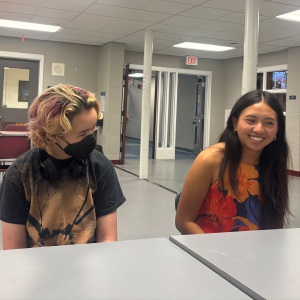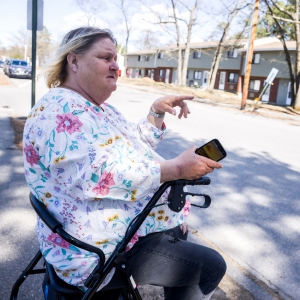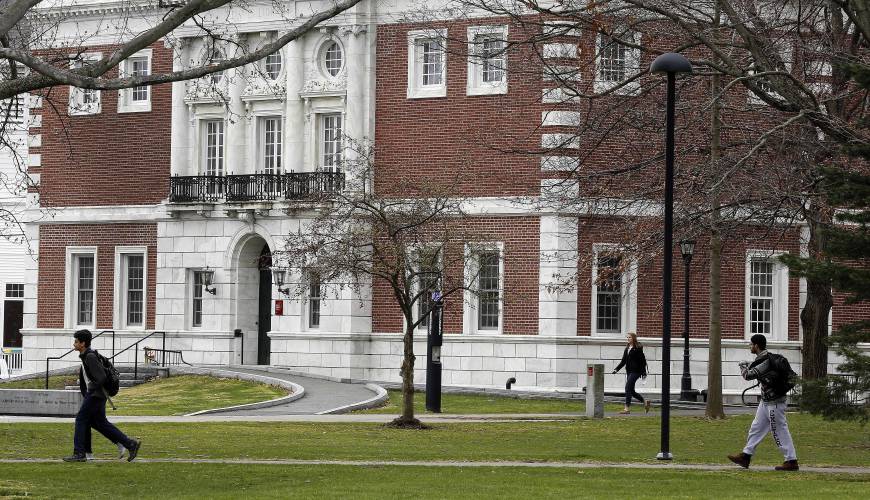Opinion: At Phillips Exeter, Palestinian-Black solidarity workshop denied permission to narrate
| Published: 02-25-2024 6:00 AM |
Robert Azzi is a photographer and writer who lives in Exeter. His columns are archived at robertazzitheother.substack.com.
On February 16, 1984, 40 years ago this past week, Palestinian-American scholar and political activist Edward Said published an essay, “Permission to Narrate,” in the London Review of Books. He remarked that while Palestinians were often in the news they didn’t often get the chance to talk about who they are, that Palestinians were systematically denied the power to communicate their own history.
On November 2003, 20 years after Said’s essay and five months after graduation, Palestinian Tamer Shabaneh, ‘03 wrotein Phillips Exeter Academy’s (PEA) school newspaper, The Exonian:
“In the Israeli press there is more debate than at places like Exeter. Is it not ironic that yelling “Free Tibet” is commendable campus-wide, while those who choose to yell “Free Palestine” are slandered as Anti-Semites and racist advocates favouring Israel’s destruction? When I gave my senior meditation and spoke about my experiences under apartheid, I was booed and vilified for daring to mention the devastating effect of Israel’s 1948 War of Independence (which Palestinians call al-Nakbah, the Catastrophe), on my family, while some other students on campus were able to maintain anti-Palestinian hate websites and openly talk about eliminating the last Palestinian alive.”
It’s 2024 now and not much has changed.
It’s been 20 years since Tamer’s meditation. I was Tamer’s unofficial guardian when he was at Exeter and I clearly remember the time when I was sitting in Phillips Church, proudly listening to Tamer wrap-up his meditation when a long-time member of the school’s faculty stood up — and, in an action previously unseen or unheard in the sanctuary — attempted to marginalize and delegitimize the meditation by minimizing Tamer’s experiences under occupation in the occupied West Bank city of Hebron. He said, I believe, “Thank you Tamer. I just want everyone to know that not all people there have similar experiences.”
Not much has changed.
Recently, in an action mirroring dozens of other academic and institutional actions across America where the voices of the Other have been canceled and erased, particularly voices supporting Palestinian liberation and freedom, PEA canceled, on the eve of the Rev. Dr. Martin Luther King, Jr. holiday, a student workshop entitled “Reflections on Palestinian-Black Solidarity for Liberation.”
Article continues after...
Yesterday's Most Read Articles
 ‘Deep flavor’ – New restaurant in downtown Concord offers creative spin on comfort food and cocktails
‘Deep flavor’ – New restaurant in downtown Concord offers creative spin on comfort food and cocktails
 ‘Over-regulation is going to create sneakier kids’: Concord High students react to impending bell-to-bell phone ban
‘Over-regulation is going to create sneakier kids’: Concord High students react to impending bell-to-bell phone ban
 Royal Gardens tenants worried about where they will live after building renovations
Royal Gardens tenants worried about where they will live after building renovations
 Reclaiming Healy Park: A symbol of renewal and a reckoning with homelessness in Concord
Reclaiming Healy Park: A symbol of renewal and a reckoning with homelessness in Concord
 Concord receives federal funding to clean old stables, paving way for stagecoach museum
Concord receives federal funding to clean old stables, paving way for stagecoach museum
 Concord-area runners tackle Mt. Washington Road Race
Concord-area runners tackle Mt. Washington Road Race
Described as “... how systems of oppression and exploitation operate concurrently and how anti-oppressive struggles are, too, connected. We will investigate meaningful acts of resistance, listen and learn from one another ... This workshop will focus on what Angela Y. Davis means by “Freedom is a Constant Struggle: Ferguson, Palestine, and the Foundations of a Movement.”
“What is solidarity?” the workshop asked students to consider. “What is our responsibility to bear witness? ... We will invite participants to explore some of the roots of Black Palestinian solidarity and to imagine and to reflect on the various methods of resistance within and across our communities.”
Canceled.
Invitation voided: Permission to Narrate denied.
Permission to consider Malcolm X’s witness from Mecca in 1964: “There were tens of thousands of pilgrims, from all over the world. They were of all colors, from blue-eyed blondes to black-skinned Africans. But we were all participating in the same ritual, displaying a spirit of unity and brotherhood that my experiences in America had led me to believe never could exist between the white and non-white.”
Permission to consider that Malcom X’s pilgrimage to Mecca was so transformative that he told Maya Angelou in 1965 that “I have met white-skinned blue-eyed men who I’ve openly called brother. I was wrong [in my previous opinions].”
Denied.
Denied an opportunity to learn why Noam Chomsky, Gore Vidal (PEA, ‘43), Toni Morrison, Carolyn Forché and 15 other writers wrote in 2006 that “Today outrage follows outrage; makeshift missiles cross sophisticated ones ... Each provocation and counter-provocation is contested and preached over. But the subsequent arguments, accusations and vows, all serve as a distraction in order to divert world attention from a long-term [Israeli] military, economic and geographic practice whose political aim is nothing less than the liquidation of the Palestinian nation.”
Denied an opportunity to read and understand why so many Black American writers and artists stand in solidarity with Palestinian aspirations for freedom, to understand that in an international, intersectional world of people of color, of LGBTQIA+ peoples, of the marginalized, occupied and oppressed are expressing solidity across caste, cultural, and religious lines.
Denied. Denied. Denied.
Permission to interrogate Nelson Mandela’s belief that “... we know too well that our freedom is incomplete without the freedom of the Palestinians.”
Denied.
Permission to consider the 2014 words of PEA’s Lamont poet of 2009, Palestinian-American Naomi Shihab Nye, who in a narration explained, “In Ferguson, an invisible line separated white and black communities. In Jerusalem, a no-man’s land separated people, designated by barbed wire.”
Denied.
Denied an opportunity to witness the connection between an unarmed teenager, Michael Brown, shot in “quiet old Ferguson, denied how understanding citizens marching with signs, “I’M A MAN TOO” “DON’T SHOOT” is connected to the Palestinians in Gaza who actually sent messages of solidarity to Ferguson – Internet petitions signed by Gaza citizens.”
Palestinians who actually sent messages from Gaza to Ferguson protestors on how to protect themselves from tear gas!
Denied to the students was an opportunity to understand that no one is just one thing,
The Exonian editorial board reported that “the workshop was designed based on academic materials and historical evidence. Its creators said, “We designed the Workshop for MLK Day 2024’s ‘Black Pain and Black Joy in Resistance’ to address students’ needs for a space to reflect on the various expressions of solidarity between Black-Americans and Palestinians, its creators stated.”
What a gift for students; what ignorance on the part of those who would control those thoughts.
I don’t know whether or how much direct influence donors or alum might have had on the Exeter administration’s decision to cancel the MLK program, but I do know that the conversation is not canceled.
“A Statement signed by Principal Bill Rawson published on February 15, 2024, in the Exonian notes: “The workshop was canceled to provide time to gather additional input and perspective around how to structure and offer opportunities for important conversations in our community on these and related subjects ... We know that many students and teachers were disappointed ... To that end, we will work with faculty, student advisers, and student leaders to create appropriate opportunities for such engagement on campus, meeting students where they are, and understanding that the needs of students will vary. These conversations have begun.”
He doesn’t really get it: The conversations have already begun, without him.
I learned of it by overhearing some angry students discussing it at Me n’ Ollies while I was picking up my favorite “chewy granola” pastry. I followed up by reading about it online.
Conversations begun in earnest by Tamer Shabaneh ‘03, by Naomi Nye, June Jordan, Toni Morrison, Michelle Alexander, Marc Lamont Hill, Mehdi Hasan, Angela Davis and so many others continue today on Facebook, on @black.palestine.pea, on Instagram and Telegram. They continue with students from around the Seacoast who sometimes meet off campus for coffee or online to discuss Gaza and the Palestinians.
“I was born a Black woman
and now
I am become a Palestinian
against the relentless laughter of evil
there is less and less living room
and where are my loved ones?
“It is time to make our way home.” — June Jordan
On and off for around 30 years, Robert Azzi was involved with Phillips Exeter Academy. He was a parent to one student, an uncle of another, and an unofficial guardian to students from Bosnia, Afghanistan, Saudi Arabia, Yemen, and Palestine. He occasionally spoke in classes or met with teachers to discuss Islam and the Middle East. He was often a volunteer working with Middle Eastern and Muslim students, and for a short time was employed as an advisor.









 Opinion: The art of diplomacy
Opinion: The art of diplomacy Opinion: After Roe: Three years of resistance, care and community
Opinion: After Roe: Three years of resistance, care and community Opinion: Iran and Gaza: A U.S. foreign policy of barbarism
Opinion: Iran and Gaza: A U.S. foreign policy of barbarism Opinion: There’s no place like firearms-free zones
Opinion: There’s no place like firearms-free zones
